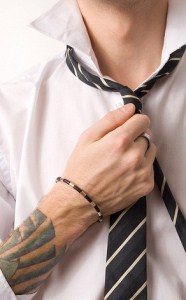The workforce includes plenty of occupations that fall somewhere between requiring a uniform or a suit, and it’s not always clear how casual or formal you should present yourself.
Right after college, I went on a job interview in a poorly fitted suit and realized the ad agency I was meeting with embraced a jeans-and-T-shirt work culture. I felt totally out of place and didn’t get the job. However, if I had been interviewing with a consulting group, my suit might not have felt so out of place.
You hope that your skills and expertise will speak more loudly than your wardrobe and looks, but they do play a role in how you’re perceived at work. The key is to find both an organization and a style that will complement your career goals.

Match your wardrobe to the job’s responsibilities
An organization’s dress code often stems from the needs of each position, such as a no-jeans policy for workers in client-facing roles at banks or law firms, or uniforms for automotive technicians who work with messy materials and dangerous tools. Use common sense to determine what your (potential) employer will expect you to wear based simply on the job’s responsibilities.
It will also reflect as good judgment to an employer if you’re spot on with your manner of dress and presentation. Carrie Mantha, founder and CEO of fashion-tech company Indira Collection, says, “As an employer, I'm looking for signs of future success – and red flags – anywhere I can find them, so clothing can be a powerful tool for job seekers. If the job calls for creativity, unique style can convey that you have that. If I need someone meticulous and hard-working, a pulled-together, crisp, conservative look can tell me more than words ever could. If I'm looking for someone who can talk and relate to Millennials, a trendy outfit can give you the edge.”
Creatives are an exception
Like Mantha mentioned, creative roles are often an exception to the standard dress code rules, because more casual dress often better fits these workers’ personalities, making them feel more comfortable and better-suited to do their jobs well. “Having owned a creative production studio for years, I’ve found that the typical advice – dress up for meetings, polished shoes and a nice shirt – can actually backfire in the creative industries,” says Evan Robinson, a photographer and director. “A unique, memorable outfit helps creatives standout in a room full of business people, and their opinions are often taken more seriously if they dress the part of an independent thinker.”
However, still be sure to find a balance between professional and personal expression, especially in interviews and client pitches. While a strong personal identity can be an asset in creative roles, it still needs to be your work and experience that speak loudest, or employers may think that you’re overcompensating for your work.

Some brands, companies need unity and uniformity
While creative positions are usually friendly to more personal expression and individuality, some roles need the unity and uniformity of suits, uniforms or standardized dress to promote an organization’s vision. That might also mean toning down your hair or makeup, as well as hiding tattoos or piercings. He says, “As an individual, I understand that tattoos and body piercings are often very personal,” says Mike Bowman, owner of CareerAndJobFairs.com and TheQuarterRoll.com, as well as author of “How To Scare The Hell Out Of Unemployment.” “To that individual, their body art may even be an extension of their identity. However, in the workplace it’s not about the individual, it’s all about the customer, and some customers can become put off or offended by another person's body art.”
Here, personal expression isn’t an asset like it can be in creative roles. Instead, matching your identity to the brand’s will align your image and actions, positioning you as a great company ambassador. Bowman says, “As a business person responsible for driving sales, I can't afford to lose customers because of an employee's individual expression of him or herself. Additionally, I want every action and image a customer views to be consistent with our brand's message. Unfortunately, an employee's body art may not match that message, so I cannot allow visible tattoos or piercings.”
Ultimately, your goal is to find a company culture that complements your style and your career goals. Moran Barnea, founder of ResumeBoost, says, “There is a direct link between company culture and dress code. In large corporations, it is more likely that dress codes will be stricter than in small ones. Also, different industries set different codes – tech is more likely to be casual than banking. However, keep in mind that there are always exceptions – your employer may want to lay down a certain dress code that is not necessarily the industry standard. Remember, you have after-work hours and the weekends to express yourself by wearing whatever you want. Being employed has it upsides (yay, paycheck) but can sometimes have certain restrictions that we all live with.”
(Picture Source: Internet)
HRVietnam - Collected

